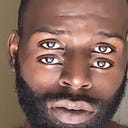Black Market Flea
Mayah Hatcher's desire for inclusivity turned into a hotbed for cultural familiarity and acceptance
In June 2022, Black Flea Market celebrated their 1st anniversary. The scene is picturesque, teeming with black creatives, models, and musicians. The space where the event takes place, The Beehive, is (no pun intended) buzzing, with people spilling out into the alleyways, creating a makeshift line that could last for hours. Once inside the event, you’re welcomed by a large grassy area that serves as the market’s dancefloor. Adorned on the brick wall is a large quilted blanket that reads, “Black Market Flea.”
The space is dressed with several food trucks, authentic clothing homies, music heads, vegan juicers, and a roller rink tucked away in the back corner. Vendors vary from skin care products, dietary supplements, vinyl records, homemade clothing, vintage merchandise, etc.
Black Market Flea elevates itself from the run-of-the-mill flea market by incorporating a lifestyle and culture without gentrifying the experience. Mayah Hatcher, a black woman, created this market as a safe place for black creators to be themselves without the fear of being criticized.
Mayah was a vendor at a flea market in Los Angeles and quickly realized she was one of the few black vendors in the space. This experience made her realize there aren’t many spaces for black people to be themselves without being ostracized for those same cultural expressions. She felt alienated by other vendors when they told her to lower her music and noticed that she was treated like a token in the market instead of an entrepreneur. Seeking a community that catered to and promoted black people was her next step. After moving from Phoenix to Los Angeles to pursue a modeling career, she focused on finding a place where she felt seen and welcomed; after being unable to find one, she created her own.
Black Market Flea is vibrant, boisterous, and deeply melanated. It’s a space for black people to unite, support, and love each other openly without fear of being judged or exploited. Combining POC vendors, local DJs, and talents of the neighborhood, the event feels more like a family reunion than a city-ordained flea market. By the fourth market, the event quickly sold out, disappointing many of the attendees standing in the line and surprising those involved. As well as creating a space for black creatives, Black Market Flea has created opportunities for vendors looking for a place to get their products directly to those who look like them. The market has given several vendors the opportunity, platform, and respect they wouldn’t get elsewhere.
After gaining notoriety on social media, black artists such as Isaiah Rashad, Theophilus London, Kyle Dion, NoName, Anwar Carrots, Blue the Great, etc. visited and, at times, contributed to the market by selling their products or performing on the intimate outdoor stage.
In celebration of the Flea’s 1st anniversary, “Shuga Shack — The After Party” was introduced. Named after the prolific piece of the same name by Ernie Barnes; the nocturnal event is another source of cultural empowerment fueled by humid beats and a “don't hold the wall” policy.
A strictly enforced “no bigotry” rule also ensures the safety of the queer community that frequents the event; a comforting yet sobering reminder that spaces must stay vigilant to protect this community, especially in the nightlife. Being able to express yourself is one of the cornerstones of Black Market Flea and that extends, affectionately, to the LGBTQ+ community.
The importance of this cannot be understated.
Queerness has been a part of the black community forever and the tolerance for it has gotten better, or some would have you think. We’re (at least in the west) consumed by the idea of progressives so much that we overlook true bigotry. Finding acceptance in your community is a key factor in accepting yourself and without that acceptance, it's much harder to put together that “am I normal” puzzle.
Spaces like Black Market Flea can introduce someone to a community they might not have at home. The phrase “safe space” has been degraded into powder beyond meaning but we must not neglect the importance a chosen community has for someone looking to find their family.
At the last flea of the year, a gift drive was held with the help of the P.A.C.K. Project and people dropped off gifts to give back to the less fortunate within the community. 2022 has been a year of turmoil and a true test of one’s stability. Seeing Black Market Flea flourish and celebrate its 1st anniversary this year amongst the constant muck of the world has been a joy. Each update is a reminder that this isn't a fad or a circus that’s come to town but a genuine afro-community that’s being constantly watered and trimmed.
It’s so much more than a Yelp suggestion for ‘what to do in LA.’
With live performances, authentic cuisine, handmade clothing, and art from a community that prides itself on authenticity — most would classify this as a lowkey music festival. What Maya and her team accomplished within the year of opening the market is genuinely inspirational. Going from less than 100 vendors in the first couple of months to having a suffocating waiting list, coupled with tickets that sell out within the hour and lines that last feature film length— they have created a hub and, in many ways, a sanctuary for blacks to come and let their hair down.
